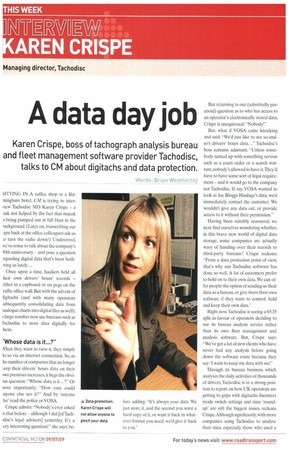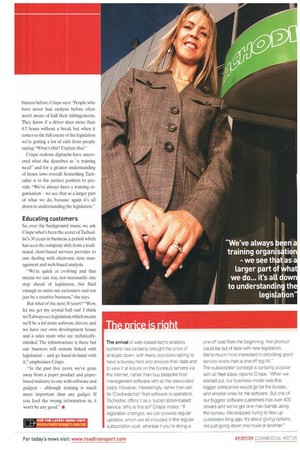A data day job
Page 20

Page 21

If you've noticed an error in this article please click here to report it so we can fix it.
Karen Crispe, boss of tachograph analysis bureau and fleet management software provider Tachodisc, talks to CM about digitachs and data protection.
Words: Brian Weathertey SITTING IN A coffee shop in a Birmingham hotel, CM is trying to interview Tachodisc MD Karen Crispe a :ask not helped by the fact that muzak s being pumped out at full blast in the
ackground. (Later on, transcribing our -.ape back at the office, colleagues ask us :o turn the radio down!) Undeterred, N e' v e come to talk about the company's (Jth anniversary and pose a question -egarding digital data that's been both!,ring us lately...
Once upon a time, hauliers held all heir own drivers' hours' records ;ither in a cupboard or on pegs on the raffic office wall. But with the advent of ligitachs (and with many operators ;ubsequently consolidating data from malogue charts into digital files as well), large number now use bureaus such as Cachodise to store data digitally for hem.
'Whose data is it...?"
When they want to view it, they simply lo so via an Internet connection. So, as he number of companies that no longer :eep their drivers' hours data on their iwn premises increases, it begs the obviills question: "Whose data is it...?" Or nore importantly: "How easy could .nyone else see it?" And by 'anyone :Ise' read the police or VOSA.
Crispe admits: -Nobody's ever asked is that before although I did [of Tachdisc's legal advisers] yesterday. It's a ery interesting question!" she says, be fore adding: -It's always your data. We just store it, and the second you want a hard copy of it, or want it back in whatever format you need, we'd give it back to you."
But returning to our (admittedly paranoid) question as to who has access to an operator's electronically stored data, Crispe is unequivocal: "Nobody!"
But, what if VOSA came knocking and said: "We'd just like to see so-andso's drivers' hours data..." Tachodisc's boss remains adamant. "Unless somebody turned up with something serious such as a court order or a search warrant, nobody's allowed to have it. They'd have to have some sort of legal requirement and it would go to the company not Tachodisc. If, say, VOSA wanted to look at Joe Bloggs Haulage's data, we'd immediately contact the customer. We wouldn't give any data out, or provide access to it without their permission."
Having been suitably reassured, we next find ourselves wondering whether, in this brave new world of digital data storage, some companies arc actually wary of handing over their records to third-party bureaus? Crispe reckons: -From a data protection point of view, that's why our Tachodisc software has done so well. A lot of customers prefer to hold on to their own data. We can offer people the option of sending us their data as a bureau, or give them their own software if they want to control, hold and keep their own data."
Right now, Tachodisc is seeing a 65:35 split in favour of operators deciding to use its bureau analysis service rather than its own fleet management and analysis software. But, Crispe says: "We've got a lot of new clients who have never had any analysis before going down the software route because they say: 'I want to keep my data with me:" Through its bureau business, which analyses the daily activities of thousands of drivers. Tachodisc is in a strong position to report on how UK operators are getting to grips with digitachs. Incorrect mode switch settings and time 'roundup' are still the biggest issues, reckons Crispe. Although significantly, with more companies using Tachodisc to analyse their data, especially those who used a
bureau before, Crispe says! "People who have never had analysis before often aren't aware of half their infringements. They know if a driver does more than 4.5 hours without a break but when it comes to the full extent of the legislation we're getting a lot of calls from people saying: -What's this? Explain that."
Crispe reckons digitachs have uncovered what she describes as "a training need" and for a greater understanding of hours laws overall. Something Tachodisc is in the perfect position to provide. "We've always been a training organisation — we see that as a larger part of what we do, because again it's all down to understanding the legislation."
Educating customers
So, over the background music, we ask Crispe what's been the secret of Tachodisc's 30 years in business. a period which has seen the company shift from a traditional, chart-based services provider to one dealing with electronic data management and web-based analysis.
"We're quick at evolving and that means we can stay, not necessarily one step ahead of legislation, but fluid enough to assist our customers and not just be a reactive business," she says.
But what of the next 30 years? "Wow, let me get my crystal ball out! I think we'll always see legislation, which means we'll be a lot more software driven, and we have our own development house and a sales team who are technicallyminded. The infrastructure is there but our business will remain linked with legislation — and go hand-in-hand with it," emphasises Crispe.
"In the past five years, we've gone away from a paper product and paperbased industry to one with software and gadgets — although training is much more important than any gadget. If you feed the wrong information in, it won't be any good." I












































































































































